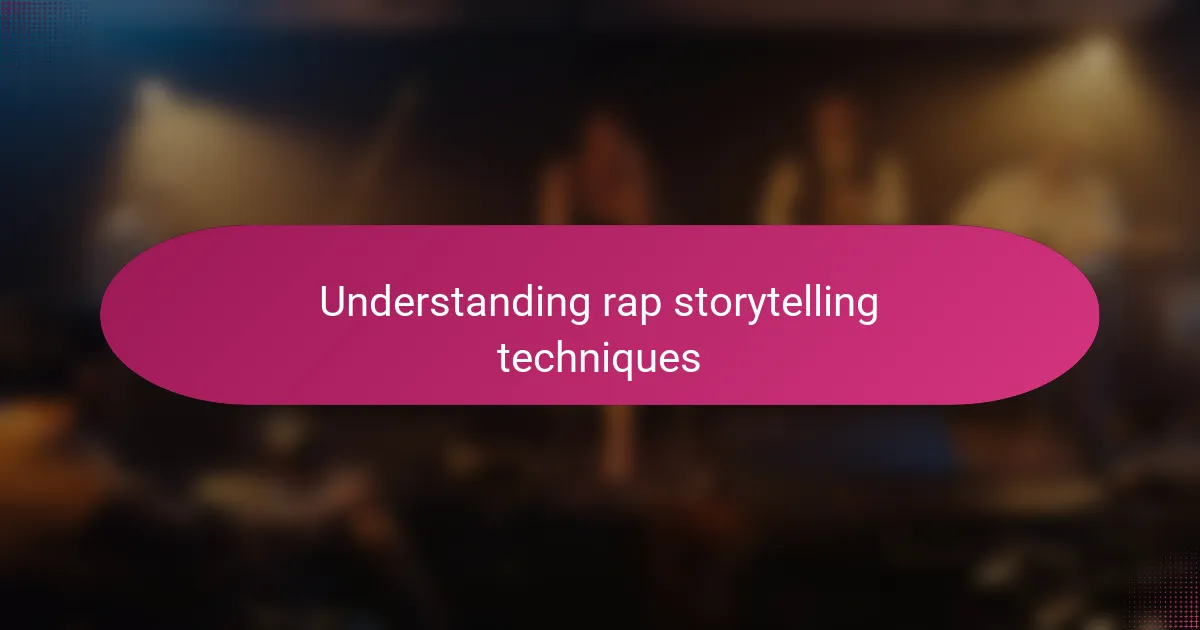Key takeaways
- The effectiveness of rap storytelling lies in blending personal experiences with universal themes, creating relatable narratives that resonate emotionally.
- 50 Cent’s lyrical economy—using precise language—enhances the impact of his storytelling, proving that every word should hold significance.
- Key themes in 50 Cent’s work include survival, loyalty, and ambition, which invite listeners into a vivid exploration of hardships and triumphs.
- Effective storytelling in rap involves careful pacing, vivid imagery, and the ability to evoke emotion while maintaining clarity in the narrative.

Understanding Rap Storytelling Techniques
When I first paid close attention to rap storytelling, I noticed how artists use vivid imagery to paint scenes that feel almost cinematic. It made me wonder: how do they make complex narratives flow smoothly within the constraints of rhythm and rhyme? This skill fascinated me because it’s not just about telling a story—it’s about making you live it through words and beats.
What struck me most is the careful balance between authenticity and artistry. The best rappers share personal experiences but package them in ways that resonate universally, mixing raw emotion with clever wordplay. I remember hearing a track where a simple metaphor unlocked an entire chapter of the artist’s life for me, and that’s when I truly understood the power of storytelling in rap.
I also realized that repetition and hooks are more than catchy elements—they’re storytelling tools that emphasize key moments and emotions. Have you ever noticed how a chorus can hammer home a feeling or idea, making the story unforgettable? From my experience, those repeated lines become a chorus in your mind long after the music stops playing.

Exploring 50 Cent’s Narrative Style
What I find compelling about 50 Cent’s narrative style is how he blends raw vulnerability with street-smart bravado. His stories don’t just recount experiences—they invite you into his world, making you feel the tension and triumph as if you lived through them yourself. Have you ever listened closely to “Many Men” and felt that mix of fear and determination seeping through every line?
His ability to switch between detailed storytelling and straightforward hooks keeps the pace engaging without losing depth. I remember dissecting “In Da Club” and realizing how its seemingly simple party anthem actually tells a layered story of survival and success. That balance between catchy rhythm and meaningful narrative is a hallmark of his style that hooks me every time.
Moreover, 50 Cent masterfully uses economy in his lyrics—there’s no wasted word or filler. Each line carries weight, whether it’s a metaphor, a street wisdom nugget, or an emotional confession. When I first picked apart verses from “If I Can’t,” it hit me how much storytelling power lies in these concise moments, making every bar count.

Key Themes in 50 Cent’s Lyrics
One thing that always stands out to me in 50 Cent’s lyrics is the theme of survival. He doesn’t just rap about making it through tough times; he makes you feel the grit, the danger, and the sheer willpower it takes to come out on top. I recall listening to “Many Men” and feeling as if every word was a heartbeat pulsing with the urgency of fight or flight—a reminder that survival isn’t just physical, but mental too.
Another recurring theme I’ve noticed is loyalty and betrayal. It’s fascinating how 50 Cent captures the complex emotions that come with trusting others in harsh environments. His lyrics often reveal not just pain from being let down but also the hard-earned lessons that shape his outlook. It made me think—how many stories of friendship and loss get buried beneath the surface of those hard beats?
Then there’s the theme of ambition and success, which feels like a thread running through almost every track. I admire how he doesn’t just boast about wealth or fame; instead, he paints a picture of relentless drive and the sacrifices behind the glory. When hearing “In Da Club,” I’m reminded that the party vibe masks a deeper story of hustle and determination—a duality that makes his lyrics vividly real to me.

Analyzing Storytelling in 50 Cent’s Albums
When diving into 50 Cent’s albums, I was struck by how each project unfolds like a chapter in a gritty novel. His storytelling isn’t just about recounting events—it’s about crafting a mood that pulls you into his reality. Have you ever noticed how the tension in “Many Men” builds like a suspenseful scene, making you hold your breath alongside him?
I also appreciate how 50 balances storytelling with accessibility. His narratives are clear and vivid, yet never feel overdone or pretentious. For instance, the straightforward but powerful storytelling in “If I Can’t” showed me how simplicity can pack an emotional punch without losing complexity.
What really hooks me is his ability to interweave personal pain with broader themes of struggle and triumph. While listening to “The Massacre,” I felt the rawness of his experiences paired with a resilience that’s almost cinematic. It made me realize that 50’s albums aren’t just collections of songs—they’re immersive stories told one verse at a time.

How I Connected with 50 Cent’s Stories
Connecting with 50 Cent’s stories felt like stepping into a world both harsh and honest, a place where his struggles and victories became deeply personal to me. I remember the first time “Many Men” played through my headphones—I wasn’t just hearing lyrics; I was absorbing a raw energy that resonated with my own battles. Have you ever experienced a song that feels like it’s telling your story, even if you come from different worlds? That’s exactly what happened with 50’s narratives.
What truly drew me in was how his storytelling felt unfiltered yet artfully composed, giving me a front-row seat to his life without any glamorization. I found myself reflecting on moments in my own life where resilience mattered most, realizing how his ability to phrase pain and ambition in such gripping ways made those stories universally relatable. It’s more than just rhymes—it’s an emotional dialogue wrapped in rhythm.
Sometimes, I paused to unravel a line or two, amazed at how much weight a single verse could carry. Those concise yet powerful bars pushed me to appreciate storytelling not just as entertainment, but as a form of connection—reminding me that behind every beat is a story waiting to be felt and understood. Have you ever caught yourself rewinding a lyric simply because it spoke to something deep inside you? That’s the magic of 50 Cent’s storytelling for me.

Lessons from 50 Cent’s Storytelling
What I’ve learned most from 50 Cent’s storytelling is the power of vulnerability paired with strength. His stories aren’t just bravado—they reveal raw emotions that hit hard because they’re honest. Have you ever noticed how admitting fear or pain can actually make a story feel more real? That’s exactly what 50 does so well, and it taught me that you don’t have to be invincible to be compelling.
Another lesson lies in his precision with words. I was amazed how he packs so much meaning into just a few bars—no wasted syllables, no fluff. This economy in storytelling makes every line resonate deeply. It made me rethink my own approach to narrative in rap: maybe less really is more when it comes to emotional impact.
Finally, 50 Cent’s use of contrast stands out as a masterclass in storytelling. He blends gritty realism with moments of hope and celebration seamlessly. Listening to tracks like “In Da Club,” I felt the tension between struggle and triumph, which kept me hooked emotionally. It made me ask myself—how can I balance darkness and light in my own storytelling to create that same gripping effect?

Applying Storytelling in Your Rap Writing
When I began applying storytelling to my rap writing, I realized it’s not enough to just rhyme words; you need to create a narrative that listeners can step into. How do you transform a series of events into something vivid? I found that focusing on key moments and emotions helps me build scenes that feel alive, just like in 50 Cent’s tracks where every line moves the story forward.
I also learned the importance of pacing, much like how 50 Cent balances detailed verses with catchy hooks. Sometimes, I catch myself asking: Am I rushing through the story, or giving it space to breathe? Slowing down at a crucial point or repeating a phrase can really emphasize the feeling I want to share, making the story stick in the listener’s mind.
Lastly, I try to keep my lyrics sharp and meaningful, trimming anything that doesn’t serve the narrative. From my experience, less can be more—each word should carry weight and purpose. Have you ever been surprised by how a few well-chosen lines can evoke an entire scene? That’s the kind of storytelling I strive for in my rap writing every time.
